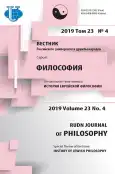Философия человеческого достоинства в проблемном поле глобального мира
- Авторы: Коломиец Г.Г.1, Парусимова Я.В.1, Колесникова И.В.1
-
Учреждения:
- Оренбургский государственный университет
- Выпуск: Том 23, № 4 (2019): ИСТОРИЯ ЕВРЕЙСКОЙ ФИЛОСОФИИ
- Страницы: 508-520
- Раздел: СОЦИАЛЬНАЯ ФИЛОСОФИЯ
- URL: https://journal-vniispk.ru/2313-2302/article/view/344813
- DOI: https://doi.org/10.22363/2313-2302-2019-23-4-508-520
- ID: 344813
Цитировать
Полный текст
Аннотация
В статье рассматриваются человеческое достоинство в аспекте современных вызовов техногенной цивилизации, вступившей в новую стадию своего развития. Человеческое достоинство как категория этики остается недооцененной в философской антропологии, поскольку в первом ряду этических ценностей гуманитарии, как правило, ставят категории свободы и справедливости. Сегодня «достоинство» приобретает особый и более высокий антропологический и социальный статус, переосмысливается понятие человеческого достоинства, выходя за рамки собственно этической категории как добродетели. В глобальном мире человеческое достоинство является ответом на такие вызовы современности, как образование коммуникативного мирового сообщества с ориентацией на цифровую цивилизацию, антропологическая проблема будущего человечества, экологическая ситуация планетарного масштаба, переориентация этико-правовых отношений глобализирующегося мира. Человеческое достоинство выступает проблемой национально-этнических и национально-государственных отношений в переходе к транснациональным регулятивным взаимодействиям. В трактовке нации авторы принимают известные два подхода к пониманию нации: с одной стороны, нация как этнокультурная общность; с другой - гражданская нация как приятие личностью государственной принадлежности.. И тот и другой подходы ведут по возможности или по необходимости к транснациональной постановке вопроса, когда приоритетом становится человеческое достоинство в своем высшем значении творческой деятельности независимо от национальной принадлежности. В этой связи затронута утопическая идея возможности глобального этоса. Авторы концентрируют внимание на антропо-аксиологическом подходе понимания человеческого достоинства, где космологический принцип бытия человека детерминирован его творческой силой. Актуальность проблемы человеческого достоинства обусловлена тем, что как бы в современном жизненном мире человек не ставил экономику выше морали, основу человеческого достоинства в его бытийной сущности составляет ценностное моральное сознание, в глубине которого «работают» базовые всечеловеческие ценности транснационального характера, находящиеся в противоречии с ценностями общества потребления, движимого практическими интересами. Человеческое достоинство в этой связи следует трактовать как абсолютную ценность и вместе с тем следует учитывать многоаспектность проблемы достоинства в условиях современных глобализационных процессов. Исходя из онтологического понимания глобализации как мегатенденции в самодвижении естественноисторического процесса, авторы обосновывают антропологическую ценность человеческого достоинства, имеющую универсальное, транскультурное значение. Применение антропо-аксиологического подхода и междисциплинарных методов раскрывает всечеловеческую ценность достоинства, основанную на антропо-социальной нравственной природе и творческой ценности человека. Сама творческая преобразовательная деятельность не будет достойной по качеству без нравственной ответственности. Современное понятие человеческого достоинства обращено к этике ответственности, а значит долженствования, которая выделяет морально-аксиологическое отношение к жизни, принятие ответственных решений в современных условиях социокультурных взаимодействий. В условиях глобализации философия человеческого достоинства становится доминантой всей сознательно-волевой деятельности, стержнем нравственного переосмысления соотношения транснационального и национального в свете толерантности, способности к ненасилию. При этом авторы указывают в постановке основного вопроса философии человеческого достоинства возможность выхода за пределы этической категории человеческого достоинства, поскольку неизменное ядро всечеловеческих ценностей добра - красоты - истины не утрачивают своего значения в глобальном, изменяющемся мире.
Ключевые слова
Об авторах
Галина Григорьевна Коломиец
Оренбургский государственный университет
Автор, ответственный за переписку.
Email: kolomietsgg@yandex.ru
доктор философских наук, профессор, профессор кафедры философии и культурологии
просп. Победы, 13, Оренбург, Российская Федерация, 460018Яна Викторовна Парусимова
Оренбургский государственный университет
Email: yanaparusimova@mail.ru
кандидат философских наук, доцент кафедры философии и культурологии
просп. Победы, 13, Оренбург, Российская Федерация, 460018Ирина Валерьевна Колесникова
Оренбургский государственный университет
Email: ivk777@bk.ru
кандидат философских наук, старший преподаватель кафедры философии и культурологии
просп. Победы, 13, Оренбург, Российская Федерация, 460018Список литературы
- Stepin VS. The problem of values in the context of the dialogue of cultures. Dialogue of cultures in the context of globalization: XI International Likhachev Scientific Readings. May 12—13, 2011. Vol. 1: Reports. St Petersburg; 2011. P. 153—157. (In Russ.).
- Kolomiets GG. From liberal to supranational values in the modern cultural space. Bulletin Orenburg State University. 2012; 4 (136):109—113. (In Russ.).
- Kuchuradi I. The concept of human dignity and human rights. Questions of philosophy. 2018;(5):43—51. [Electronic resource]. Access: http://vphil.ru/index.php?option=com_ content&task= view&id=1953&Itemid=52). (In Russ.).
- Guseynov AA. Philosophy — thought and action: articles, reports, lectures, interviews. St Petersburg; 2012. 848 p. (In Russ.).
- Voropaeva YuP. Ethics of human dignity in the context of globalization: diss. for competition scholar. degree of candidate philosopher. Sciences, Moscow: Lomonosov State University; 2015. 188 p. (In Russ.).
- Voropaeva YuP, Kolomiets GG. Ethics of human dignity: history and modernity. Orenburg, 2017. 244 p. (In Russ.).
- Kofman E, Youngs G, eds. Globalization: Theory and Practice. London: Continuum, 1996. P. 44—45.
- Chumakov AN. On the subject and boundaries of globalism. Age of globalization. 2008;(1):8—13. (In Russ.).
- Barlybaev KhA. Man, globalization, sustainable development: a monograph. Moscow; 2007. 276 p. (In Russ.).
- Granin YuD. Globalization: the dialectic of historical forms of implementation. Age of globalization. 2014;(1):94; Inozemtsev VL. Modern globalization and its perception in the world. Age of globalization. 2008;(1):44. (In Russ.).
- Held D. Global Transformations: Politics, Economics, Culture. Moscow; 2004. 576 p.
- Goldman AH. Life's Values: Pleasure, Happiness, Well-Being, and Meaning. University of Miami, 2018. 192 p.
- Tugarinov VP. On the values of life and culture. Leningrad; 1960; Tugarinov LP. The theory of values in Marxism. Leningrad; 1968. 124 p. (In Russ.).
- Tail VM. Ethics of human dignity. Moscow; 1998. 176 p. (In Russ.).
- Agazzi E. Rethinking the philosophy of science today. Questions of Philosophy. 2009;(1):40—52. (In Russ.).
- Voropaeva YuP, Kolomiets GG. Ethics of human dignity: history and modernity: a monograph. Orenburg; 2017. 244 p. (In Russ.).
- Huseynov AA. Once again about the possibility of a global ethos. Age of Globalization. 2009;(1):16—27. (In Russ.).
Дополнительные файлы









